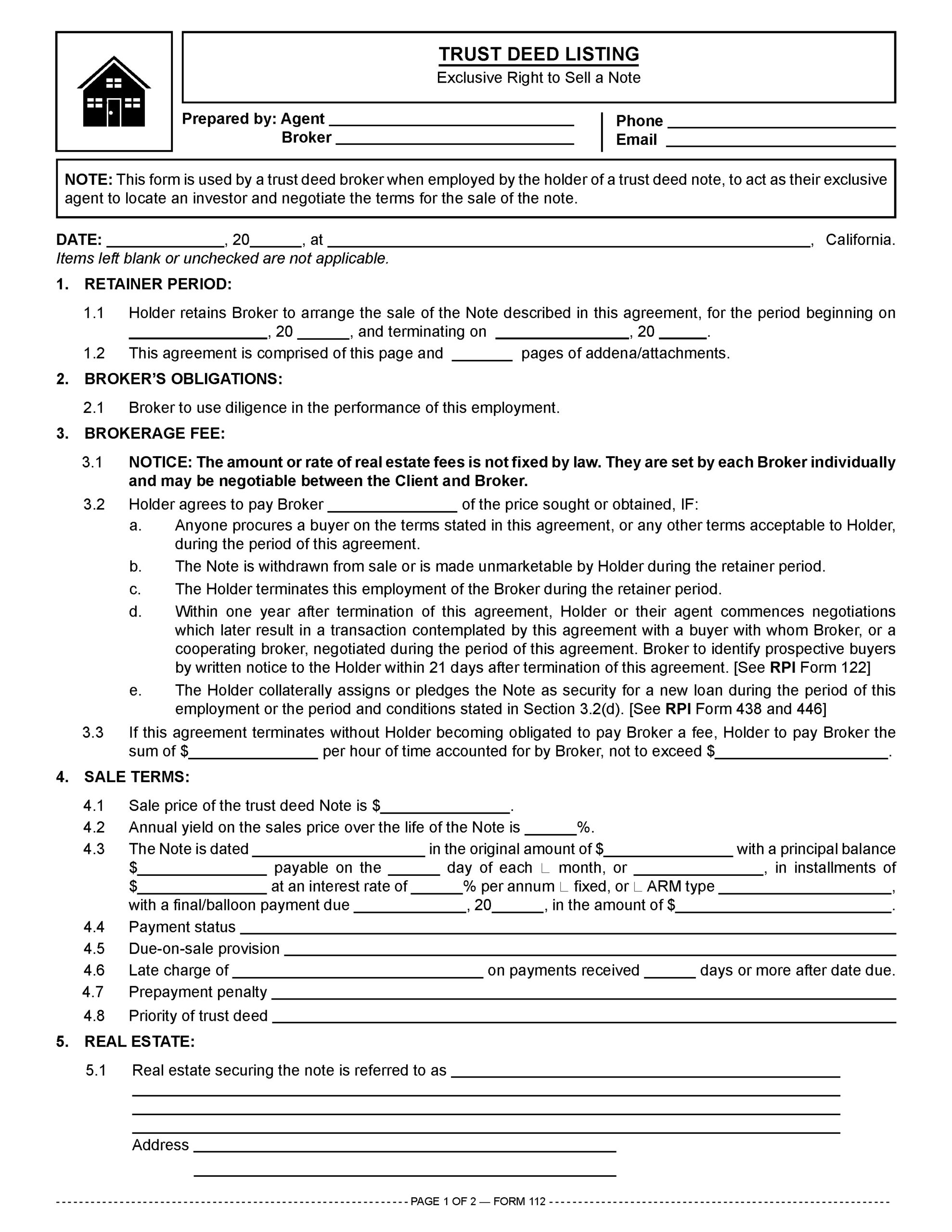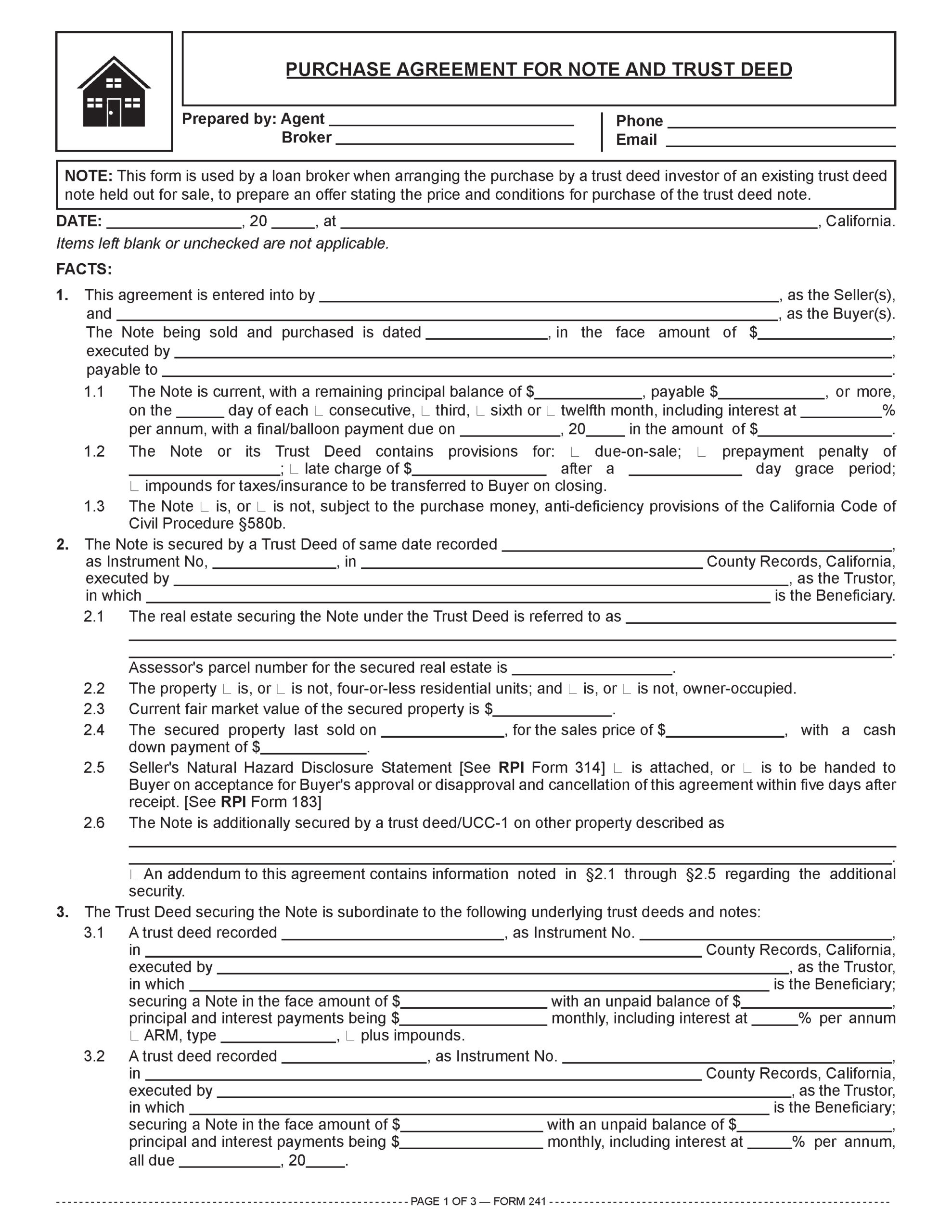The trust deed broker’s investment opportunities
Trust deed brokers solicit individuals who invest their cash funds in interest-bearing assets to consider investing in trust deed notes. With yields higher than mortgage backed bonds (MBBs), individuals invest directly in the ownership of trust deed notes, sometimes called paper, secured by real estate in low-risk loan-to-value conditions rather than purchasing MBBs or dividend stocks.
A trust deed investor, acting independent of Wall Street’s MBB market, invests in trust deed notes. To invest in trust deed notes, this class of investor uses a trust deed broker, rather than an investment banker, to assist them to:
- arrange a business-purpose mortgage evidenced by a note in favor of the investor making the loan and secured by a trust deed lien on real estate, a process called origination (distinguished from origination in the context of a consumer-purpose mortgage);
- purchase an existing trust deed note, called an absolute assignment; or
- make a mortgage-backed loan (MBL) evidenced by a note in favor of the investor secured by an existing note and trust deed held by the borrower, called hypothecation or collateral assignment.
Stages of trust deed investment
Whether an investor purchases a trust deed note or makes a loan collaterally secured by a existing trust deed note held by the borrower, a prudent investor and a competent trust deed broker undertake a due diligence investigation. This effort determines the sufficiency of the borrower’s creditworthiness and the property value as sufficient to justify funding the origination or purchase of a trust deed note or collateralized note. [See RPI e-book Mortgage Loan Brokering & Lending, Chapter 43]
The loan broker’s due diligence effort is a condition met for every trust deed investment as an agency duty owed the investor to document and analyzes the risks of loss which may be present in the investment, including:
- the creditworthiness of the signatories to the trust deed note for propensity to repay amounts when due;
- the real estate provided as security described in the trust deed (physical condition, title profile, location, rental value, property value) to enforce satisfaction of the note;
- the payment history on any trust deed note purchased or collaterally assigned; and
- title insurance guaranteeing the trust deed status and position on title.
An investor’s use of a trust deed broker retained under an employment agreement to perform the due diligence investigation and analysis determines the investor’s risks in funding the origination or purchase of a trust deed investment. Also, a trust deed broker typically has an inventory of listed trust deed notes available with a complete marketing package delivered under a transmittal letter for an investor to consider. [See RPI Form 233]
Related article:
MLO recession survival guide Part 2: Buyers’ agents and underwater home sellers
The trust deed listing agreement
Trust deed noteholders, particularly carryback sellers, often decide to sell their trust deed notes. The task of cashing out a trust deed note investment requires a trust deed investor to be located who is interested in acquiring the note.
Here, a trust deed broker is employed to locate an investor and negotiate the sale of a trust deed note for a fee. To achieve this employment, the broker enters into a trust deed listing agreement with the noteholder. [See RPI Form 112]
The listing agreement spells out what the noteholder can expect the broker to do and provides the broker with the necessary written fee agreement to provide certainty about employment activities and enforcement of the fee. [See RPI Form 112]
The broker employed always has the general duty to disclose to both transaction participants all facts and terms of the debt to be evidenced by the note and trust deed or a trust deed note to be sold. The disclosures include information that may affect the willingness of the noteholder or the investor to enter into a transaction for the sale or hypothecation of the trust deed note, collectively called material facts. [Barry v. Raskov (1991) 232 CA 3d 447]
The listing agreement calls for the noteholder’s disclosure of all material facts regarding the trust deed note to be assigned. In turn, the broker is duty bound to disclose these facts to a prospective trust deed investor on commencement of negotiations — up front — to acquire or originate a the trust deed note.
When a broker enters into an agreement with a trust deed noteholder to be employed to act as their sole agent for a fixed period of time, the broker uses the Trust Deed Listing — Exclusive Right to Sell a Note published by Realty Publications, Inc. (RPI). The form allows the broker and their agents to locate a trust deed investor and arrange a sale of the note and trust deed. [See RPI Form 112]
The Trust Deed Listing — Exclusive Right to Sell a Note discloses:
- the terms of the trust deed note, including:
- the asking price for the trust deed note [See RPI Form 112 4.1];
- the annual yield on the asking price over the remaining life of the note [See RPI Form 112 4.2];
- the original amount, principal balance, payment terms and interest rate of the note [See RPI Form 112 4.3];
- any due-on-sale, late charge and prepayment penalty provisions in the note or trust deed [See RPI Form 112 §4.5 – 4.7]; and
- the priority of the trust deed on title to the described real estate [See RPI Form 112 4.8];
- the identification of the real estate securing the note [See RPI Form 112 5.1];
- the amount and terms of all encumbrances on the real estate including property taxes, assessments, trust deeds and judgments [See RPI Form 112 6]; and
- any personal property included as additional security for the note. [See RPI Form 112 7]
Related article:
The trust deed note as personal property
A negotiable instrument, such as a promissory note secured by a trust deed, contains an unconditional promise to pay a scheduled dollar amount to the noteholder. A trust deed note, being a negotiable instrument, may be absolutely or collaterally assigned to others, such as a trust deed investor.
Buying a trust deed note, such as a carryback mortgage, can be a reliable and profitable investment for trust deed investors, also called private money lenders or hard money lenders.
Comparable to a buyer of real estate entering into a purchase agreement with the advice and assistance of their transaction agent (TA), the trust deed investor buying a carryback note does so with the advice and assistance of the trust deed broker they employ. [See RPI Form 241]
The investor’s broker gathers information provided by the noteholder prior to preparing an offer to purchase a trust deed note. Relevant information to be collected and reviewed with the investor includes:
- the terms in the trust deed note;
- the existing title policy insuring the trust deed (the note is not insurable);
- the condition and resale-rental value of the real estate securing the debt;
- a title profile on the real estate that is security for the note; and
- data on the real estate’s operating expenses (and income when it is income-producing property).
Additional disclosures to be received and reviewed by the investor with their broker before closing include a request for:
- a trustor’s offset statement from the owner of the secured property [See RPI Form 414]; and
- a beneficiary statement from each holder of trust deed notes encumbering the property. [See RPI Form 415]
Prudent trust deed brokerage practice compels the investor’s broker to investigate and analyze each and every document associated with the note and trust deed offered for sale.
When the mortgage being purchased is a carryback note, all the disclosures and agreements from the sale are also obtained from the seller and reviewed to determine both:
- the sufficiency of the property as security; and
- the investment quality of the trust deed note.
Further, the investor and their trust deed broker review the hazard and title insurance policies for their sufficiency to cover risks of loss and the conditions of title surrounding the recorded trust deed. An appraisal or BPO of the property’s value is also appropriate to ensure it functions as adequate security, as though the investment were the origination of a mortgage by an institutional lender.
Related article:
The purchase agreement to acquire a trust deed note
After the noteholder’s broker has gathered and reviewed information on the trust deed note, property conditions, and title profile with a trust deed investor they have located, the broker prepares a note and trust deed purchase agreement for the investor to consider signing as an offer to purchase. [See RPI Form 241]
When arranging the purchase by a trust deed investor of an existing trust deed note held out for sale, a loan broker uses the Purchase Agreement for Note and Trust Deed published by RPI. The form allows the loan broker to prepare an offer stating the price and conditions for purchase of the trust deed note. [See RPI Form 241]
The Purchase Agreement for Note and Trust Deed contains provisions thoroughly covering:
- the terms and identity of the note being purchased, such as the current principal balance, payment schedule and the existence of final/balloon payment, due-on clause or prepayment penalty provision [See RPI Form 241 1 ];
- any senior encumbrances of record;
- the real estate securing the debt, including its current fair market value (FMV), the type of property and whether it is owner-occupied;
- the terms of the purchase of the note, such as the purchase price;
- whether the note is to be transferred by way of an assignment or endorsement; and
- the broker fee to be paid. [See RPI Form 241]
Related article:
Want to learn more about receiving and splitting broker fees? Click the image below to download the RPI book cited in this article.

















